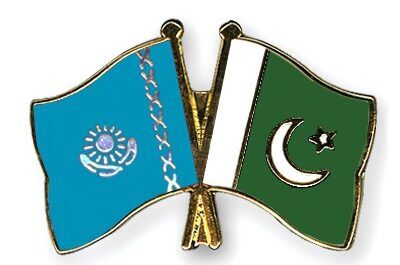New Kazakhstan Celebrating Journey of Sovereignty and Progress on 32nd Independence Day
18Dec
Editor’s Desk
(Courtesy Embassy of Kazakhstan in Islamabad, Gov of Republic of Kazakhstan and Astana Times)
The largest economy in Central Asia, The biggest land locked as well as land linked country in the world, the Republic of Kazakhstan marks its 32nd Independence Day on Dec. 16. The Declaration on the State Sovereignty of the Kazakh SSR (Soviet Socialist Republic) was adopted on Oct. 25, 1990, representing the country’s first step toward independence. The declaration became the legal basis for developing and adopting the constitutional law on the Independence of Kazakhstan in 1991.
The Supreme Council enacted the law on independence and state sovereignty, securing legal recognition as an independent democratic state on Dec. 16, 1991. The legislation empowered Kazakhstan to autonomously determine and pursue domestic and foreign policies, marking a pivotal moment in its modern history.
The declaration of independence signaled a new era for Kazakhstan, offering the opportunity to construct a self-governed state, foster economic and cultural growth, and assert an independent foreign policy. In the aftermath of independence, Kazakhstan established a parliament, implemented a judicial system, and formed armed forces, including the Republican Guard, border troops, and naval forces.
In June 1992, Kazakhstan solidified its state symbols by approving the national flag and coat of arms. The introduction of the national currency, the tenge, in 1993 further emphasized the country’s autonomy, becoming the sole legal tender within Kazakhstan.
The day also serves as a moment of remembrance of the tragic events that unfolded in Almaty in December 1986. During this period, Kazakh youth protested against Soviet policies, showcasing the people’s determination for independence. The day is a reminder of the country’s high goal – to evolve into a robust, prosperous, sovereign state. The celebration holds particular importance as a tribute to those who championed Kazakhstan’s sovereignty and the freedom of its people.
Pakistan and Türkiye were the first countries to recognize Kazakhstan’s independence shortly after the declaration. Russia, Iran, Switzerland, the United States, Brazil, Hungary, Australia, Japan, and other countries followed in this acknowledgment.
Over the years, Kazakhstan has made significant strides in implementing democratic principles and safeguarding human rights, positioning itself as a regional leader in these reforms.
The country has undergone an impressive transformation, earning respect globally. The country’s multi-vector foreign policy, a balancing act of diplomacy, showcases its efforts to maintain amicable relations with major global powers – Russia, China, the European Union, and the United States and foster strong collaborations with influential international organizations.
A landmark initiative was Kazakhstan’s voluntary renunciation of nuclear weapons, designating itself as a nuclear-free nation. Kazakhstan has spearheaded the global anti-nuclear movement, symbolized by the closure of the Semipalatinsk test site, where over 450 tests occurred in 40 years. This closure marked the inception of international efforts toward a nuclear-free world.
Kazakhstan is a nation with a rich cultural heritage. The declaration of independence in 1991 marked a significant turning point, heralding Kazakhstan’s freedom and self-governance, setting the stage for its unique path to development.
Visionary leaders such as President Nursultan Nazarbayev and President Kassym-Jomart Tokayev and pivotal events like the Alma-Ata Declaration played instrumental roles in shaping Kazakhstan’s path towards independence.
President Kassym-Jomart Tokayev’s pioneering policies have played a crucial role in shaping Kazakhstan’s trajectory after independence. His leadership emphasizes economic diversification, social reforms, and diplomatic engagement to navigate the nation towards sustained development and global recognition. Under his guidance, Kazakhstan has focused on bolstering economic diversification, enhancing social reforms for inclusivity, and fostering diplomatic relationships on the international stage.
Independence symbolizes freedom, self-governance, and the ability to chart a unique course towards progress and development for Kazakhstan.
Independence of Kazakhstan experienced a revival of its cultural heritage, established a democratic political system, and embarked on economic reforms that transformed the nation.
Independence Day celebrations in Kazakhstan resonate with vibrant ceremonies, cultural events, and demonstrations of national unity. Traditional performances, exhibitions showcasing Kazakh heritage, and military parades are integral parts of these festivities, highlighting the country’s cultural richness and patriotic spirit.
Since gaining independence, Kazakhstan has made significant strides in economic growth, educational reforms, technological innovation, and infrastructure development. The nation’s active engagement in global initiatives, including hosting Expo 2017 and participation in forums like the Conference on Interaction and Confidence-Building Measures in Asia (CICA), showcases Kazakhstan’s rising influence and commitment to international cooperation.
Challenges in economic diversification, inclusivity, and navigating geopolitical complexities persist. However, President Tokayev’s proactive policies and strategic approaches indicate Kazakhstan’s dedication to overcoming these challenges and fostering sustainable growth.
Kazakhstan’s Independence Day stands as a testament to the nation’s resilience, determination, and achievements. Celebrating this day not only honors the past struggles but also serves as a reminder of the importance of cherishing and safeguarding national independence. From the challenges faced to the aspirations for the future, Kazakhstan’s journey offers valuable lessons in resilience and the pursuit of progress.
Pakistan Kazakhstan Relations
Pakistan was among the first in the world to have recognized Kazakhstan in 1991 as a sovereign state. Diplomatic relations has been functioning Islamabad since February 24, 1992. Since November 27, 1994, the Embassy of of Kazakhstan has been functioning in Islamabad.The first Ambassador was a prominent lawyer and diplomat Aitmukhambetov Tamas Kalmukhambetovich.
